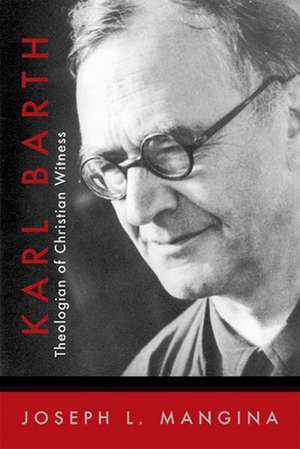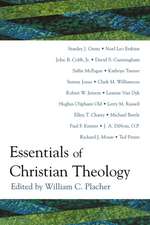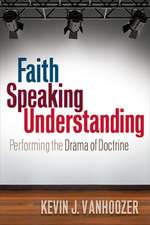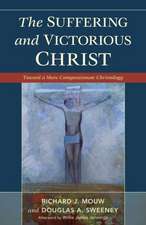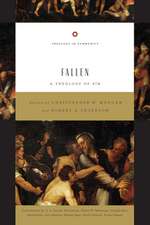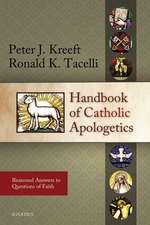Karl Barth
Autor Joseph L. Manginaen Limba Engleză Paperback – 14 noi 2004
The thought of Karl Barth has undergone a remarkable renewal of interest in recent decades. Joseph Mangina's "Karl Barth: Theologian of Christian Witness" offers a concise, accessible guide to this important Christian thinker. Unique among introductions to Barth, it also highlights his significance for Christian ecumenism and brings his views into conversation with other contemporary theologians.
| Toate formatele și edițiile | Preț | Express |
|---|---|---|
| Paperback (2) | 224.36 lei 3-5 săpt. | |
| Westminster John Knox Press – 14 noi 2004 | 224.36 lei 3-5 săpt. | |
| Taylor & Francis – 25 noi 2004 | 259.98 lei 6-8 săpt. | |
| Hardback (1) | 1014.74 lei 6-8 săpt. | |
| Taylor & Francis – 12 oct 2017 | 1014.74 lei 6-8 săpt. |
Preț: 224.36 lei
Nou
Puncte Express: 337
Preț estimativ în valută:
42.94€ • 44.36$ • 35.73£
42.94€ • 44.36$ • 35.73£
Carte disponibilă
Livrare economică 04-18 martie
Preluare comenzi: 021 569.72.76
Specificații
ISBN-13: 9780664228934
ISBN-10: 0664228933
Pagini: 226
Dimensiuni: 166 x 233 x 13 mm
Greutate: 0.35 kg
Editura: Westminster John Knox Press
ISBN-10: 0664228933
Pagini: 226
Dimensiuni: 166 x 233 x 13 mm
Greutate: 0.35 kg
Editura: Westminster John Knox Press
Notă biografică
Joseph L. Mangina is Associate Professor of Systematic Theology at Wycliffe College in Toronto, Ontario, Canada. He has served as a member of the Center of Theological Inquiry in Princeton, New Jersey.
Cuprins
Contents: Preface; Introduction; The laughter of the angels: on reading Barth; Speech and mystery: revelation; Lord of the covenant: God; Heaven and earth: creation; Into the far country: reconciliation; Christian existence: church and ethics; The finger of the Baptist: Barth and the Christian witness; References; Index.
Recenzii
'Professor Mangina’s book will be especially prized by students of theology and their teachers as a superbly executed and flawlessly written guide to the greatest work of theology of the twentieth century, Barth’s Church Dogmatics. Mangina tells us enough about Barth to convince us that it would be worth the effort to take the plunge into his theology itself. That’s the mark of a masterful introduction: it does not try to replace the original with a scaled-down summary but leaves the reader impatient to get on to the real thing.' Garrett Green, Professor of Religious Studies, Connecticut College, USA 'Barth studies are currently blessed with a number of new introductions. Mangina's book takes its place alongside the excellent new offerings by John Webster and Eberhard Busch. Mangina has mined some of the relatively untapped posthumous "Complete Edition" (Gesamtausgabe) materials to add color and depth to our understanding of Barth. This volume will be widely used in the classroom.' George Hunsinger, McCord Professor of Systematic Theology, Princeton Theological Seminary, USA '... a lively introduction to the immense resource of Church Dogmatics...' Encounter 'Mangina [...] provides [...] a clear and direct introduction - and does so brilliantly... Mangina has written a far more serviceable and constructive (and enjoyable) introduction, which, like all really good introductions, speaks to more than simply the beginners.' Themelios 'One could not ask for a better text to introduce theology students to Barth's work, and even for the well-versed Barth reader, Mangina's presentation is fresh, astute and appealing.' Christian Century 'Joseph Mangina succeeds where many others have failed in offering a readable yet comprehensive introduction to Barth's magum opus, the eight-thousand-page Church Dogmatics. Mangina's succinct and clear prose reads like that of a seasoned lecturer who knows how to draw out the important distinctions and make the relevant cri
Descriere
Descriere de la o altă ediție sau format:
The thought of Karl Barth (1886-1968) has undergone a remarkable renewal of interest in the past twenty years. Joseph Mangina's Karl Barth: Theologian of Christian Witness offers a concise, accessible guide to this important Christian thinker. Uniquely among introductions to Barth, it also highlights his significance for Christian ecumenism. The first chapter describes Barth's extraordinary life, from his youthful break with liberalism during the First World War, to his mature theology in the Church Dogmatics. Subsequent chapters offer a detailed reading of this magisterial work, and place Barth in dialogue with five contemporary thinkers: George Lindbeck on revelation, Michael Wyschogrod on election, Stanley Hauerwas on creation, Robert Jenson on reconciliation, and Henri de Lubac on the church. These ecumenical conversations not only set Barth's thinking in greater relief, but serve to demonstrate its continuing theological fruitfulness. The book concludes by examining Barth's wider significance for the church in our time.
The thought of Karl Barth (1886-1968) has undergone a remarkable renewal of interest in the past twenty years. Joseph Mangina's Karl Barth: Theologian of Christian Witness offers a concise, accessible guide to this important Christian thinker. Uniquely among introductions to Barth, it also highlights his significance for Christian ecumenism. The first chapter describes Barth's extraordinary life, from his youthful break with liberalism during the First World War, to his mature theology in the Church Dogmatics. Subsequent chapters offer a detailed reading of this magisterial work, and place Barth in dialogue with five contemporary thinkers: George Lindbeck on revelation, Michael Wyschogrod on election, Stanley Hauerwas on creation, Robert Jenson on reconciliation, and Henri de Lubac on the church. These ecumenical conversations not only set Barth's thinking in greater relief, but serve to demonstrate its continuing theological fruitfulness. The book concludes by examining Barth's wider significance for the church in our time.
